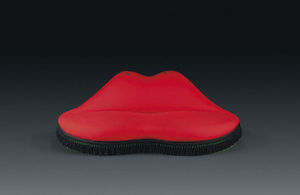Dali’s Mae West Lips Sofa at risk of leaving the UK
Arts Minister steps in to prevent iconic sofa from export.

Mae West Lips Sofa, by Salvador Dalí and Edward James.
Arts Minister John Glen has placed a temporary export bar on Mae West Lips Sofa, by Salvador Dalí and Edward James, to provide an opportunity to keep it in the country.
The sofa is at risk of being exported from the UK unless a buyer can be found to match the asking price of £480,281.56 plus VAT.
One of the most instantly recognisable pieces of furniture of the 20th century, the sofa was also a collaboration between Dalí, one of the century’s most important and influential artists and James, a key figure in the international recognition and promotion of Surrealism.
The decorative elements of the sofa correspond to the decoration of the interior of Monkton House, West Sussex, which was originally designed by Sir Edwin Lutyens in 1902 for Edward James’s parents. As part of his renovation of the interior of the House in the mid-1930s, James was assisted by architects Christopher ‘Kit’ Nicholson and Hugh Casson, as well as decorator Norris Wakefield.
Together they created a wondrous assortment of Victorian, Regency and Surrealist design, with intentionally shocking Surrealist objects filling the spaces and surfaces of the house.
Five Mae West Lips Sofas were made in total; all in 1938. This particular version of the sofa was altered by James from the other versions to make it an integral part of the decoration of Monkton House and to fit with his vision for a Surrealist interior.
Its dimensions, textiles and colour differ from other versions, and it was also elongated to give the lips a more satisfactory appearance.
Arts Minister John Glen said:
This iconic piece is considered to be the single most important example of Surrealist furniture ever made in Britain. I very much hope that a buyer comes forward to keep this unique item in the UK.
The decision to defer the export licence follows a recommendation by the Reviewing Committee on the Export of Works of Art and Objects of Cultural Interest (RCEWA), administered by the Arts Council.
RCEWA member Richard Calvocoressi said:
Salvador Dalí and Edward James’s sofa in the shape of Mae West’s lips shares with Meret Oppenheim’s fur-covered cup, saucer and spoon of the same date (Museum of Modern Art, New York) the distinction of being the most famous object in the history of Surrealism.
But it is more than a witty surrealist sculpture or a striking example of fantasy furniture. It is a masterpiece of Pop art 25 years before Pop was invented.
The RCEWA noted the power of the image of the sofa in the 20th century. It made its recommendation on the grounds of the sofa’s close connection with our history and national life, its outstanding aesthetic importance and its significance for the study of furniture history, as well as the history of design and Surrealist art.
The decision on the export licence application for the sofa will be deferred until 16 February. This may be extended until 16 May if a serious intention to raise funds to purchase it is made at the recommended price of £480,281.56 (plus VAT of £16,600).
Organisations or individuals interested in purchasing the sofa should contact the RCEWA on 0845 300 6200.
An image of the sofa can be downloaded via our flickr site.
ENDS
For media information contact: Yasmin Kaye Senior Communications Officer Department for Digital, Culture, Media and Sport Tel: 0207 211 6489 Email: yasmin.kaye@culture.gov.uk
Notes to editors
- Details of the sofa are as follows: Composed of a red felted wool top cover with green decorative appliques in the form of larvae and black wool fringing over traditional horse-hair upholstery and webbing on a wooden carcass. Measuring 79cm (h) by 202cm (w) by 92cm (d), the sofa was probably made by Green & Abbot, London, in 1938.
- The Reviewing Committee on the Export of Works of Art and Objects of Cultural Interest is an independent body, serviced by The Arts Council, which advises the Secretary of State for Digital, Culture, Media and Sport on whether a cultural object, intended for export, is of national importance under specified criteria.
- The Arts Council champions, develops and invests in artistic and cultural experiences that enrich people’s lives. It supports a range of activities across the arts, museums and libraries – from theatre to digital art, reading to dance, music to literature, and crafts to collections. www.artscouncil.org.uk.